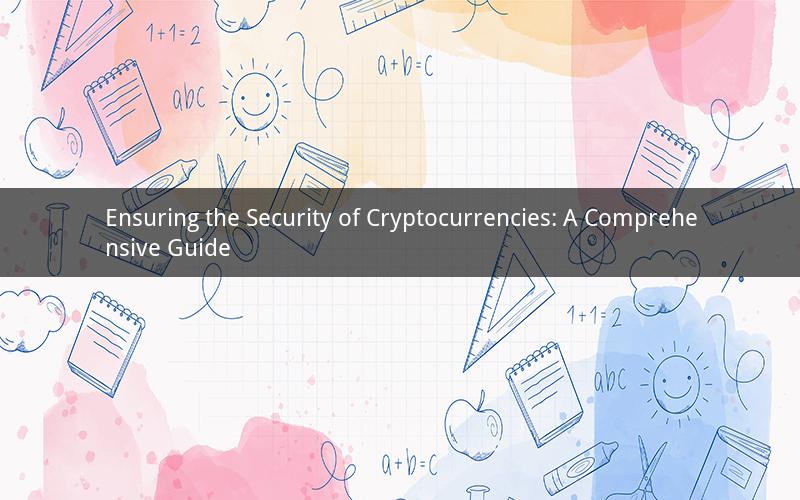
Introduction:
In the rapidly evolving world of cryptocurrencies, security remains a paramount concern for users and investors alike. With the increasing number of cyber threats and fraudulent activities, it is crucial to understand how to make cryptocurrencies secure. This article delves into the various measures and practices that can help safeguard your digital assets from potential risks.
1. Utilize Strong Passwords and Two-Factor Authentication:
One of the most fundamental steps in securing your cryptocurrencies is to use strong passwords and enable two-factor authentication (2FA). A strong password should be a combination of uppercase and lowercase letters, numbers, and special characters. Avoid using easily guessable passwords like birthdays or common words. Additionally, enabling 2FA adds an extra layer of security by requiring a second form of verification, such as a unique code sent to your phone.
2. Store Cryptocurrencies in Secure Wallets:
The choice of wallet is crucial in ensuring the security of your cryptocurrencies. There are primarily two types of wallets: hot wallets and cold wallets. Hot wallets are connected to the internet and offer convenience but are more susceptible to hacking. On the other hand, cold wallets, such as hardware wallets or paper wallets, store your cryptocurrencies offline, making them less vulnerable to online threats. It is advisable to use a combination of both hot and cold wallets to strike a balance between convenience and security.
3. Regularly Update Your Software:
Software vulnerabilities are often exploited by hackers to gain unauthorized access to your cryptocurrencies. To mitigate this risk, it is essential to keep your software up to date. This includes your operating system, antivirus software, and cryptocurrency wallet applications. Regular updates ensure that any security vulnerabilities are patched, reducing the chances of successful cyber attacks.
4. Be Wary of Phishing Scams:
Phishing scams are one of the most common methods used by hackers to steal cryptocurrencies. These scams involve sending fraudulent emails or messages that appear to be from legitimate sources, tricking users into revealing their private keys or login credentials. Always verify the authenticity of any communication before taking any action. Be cautious of emails requesting sensitive information, and never click on suspicious links.
5. Backup Your Wallets:
Data loss can occur due to various reasons, such as hardware failure or accidental deletion. To prevent losing your cryptocurrencies, it is crucial to regularly backup your wallets. This can be done by creating a copy of your wallet file or using backup services provided by some wallets. Ensure that the backup is stored in a secure location, away from potential physical or digital threats.
6. Educate Yourself About Security Best Practices:
Staying informed about the latest security threats and best practices is crucial in protecting your cryptocurrencies. Regularly educate yourself about common scams, phishing techniques, and security measures. By staying vigilant and informed, you can better identify potential risks and take appropriate actions to mitigate them.
7. Use Secure Exchanges:
When trading cryptocurrencies, it is important to use reputable and secure exchanges. Research and choose exchanges that have a strong track record of security measures and are well-regarded in the community. Look for exchanges that offer features like cold storage for a significant portion of their users' funds, advanced security protocols, and insurance for lost or stolen assets.
8. Be Mindful of Public Wi-Fi Networks:
Public Wi-Fi networks are often unsecured, making them a prime target for hackers. Avoid accessing your cryptocurrency wallets or conducting any sensitive transactions while connected to public Wi-Fi. If you must use public Wi-Fi, consider using a virtual private network (VPN) to encrypt your internet connection and protect your data.
9. Avoid Sharing Private Keys or Seed Phrases:
Private keys or seed phrases are crucial for accessing and controlling your cryptocurrencies. Never share these sensitive pieces of information with anyone, as they can be used to steal your assets. Keep your private keys or seed phrases secure and only use them when necessary.
10. Stay Informed About Security Updates and Announcements:
Stay updated with the latest security updates and announcements from your cryptocurrency exchanges, wallet providers, and blockchain networks. Security breaches and vulnerabilities can occur at any time, and staying informed allows you to take immediate action to protect your assets.
Frequently Asked Questions:
1. How can I determine if a cryptocurrency wallet is secure?
To ensure the security of a cryptocurrency wallet, check for the following features: strong encryption, two-factor authentication, reputable reviews, and a track record of maintaining secure operations.
2. Can I use the same password for all my cryptocurrency wallets?
No, it is highly recommended to use unique passwords for each wallet to minimize the risk of a single compromised password leading to the loss of all your cryptocurrencies.
3. Are paper wallets secure?
Paper wallets can be secure if properly generated and stored in a safe and secure location. However, they are susceptible to physical damage or loss, so it is important to handle them with care.
4. Can I use a VPN to protect my cryptocurrency transactions on public Wi-Fi?
Yes, using a VPN can encrypt your internet connection and protect your data from potential eavesdroppers on public Wi-Fi networks, making your cryptocurrency transactions more secure.
5. How can I stay informed about the latest security threats and best practices?
Stay updated by following reputable cryptocurrency news sources, joining online communities, and attending cryptocurrency conferences or webinars. Regularly educate yourself about the latest security trends and best practices to stay one step ahead of potential threats.